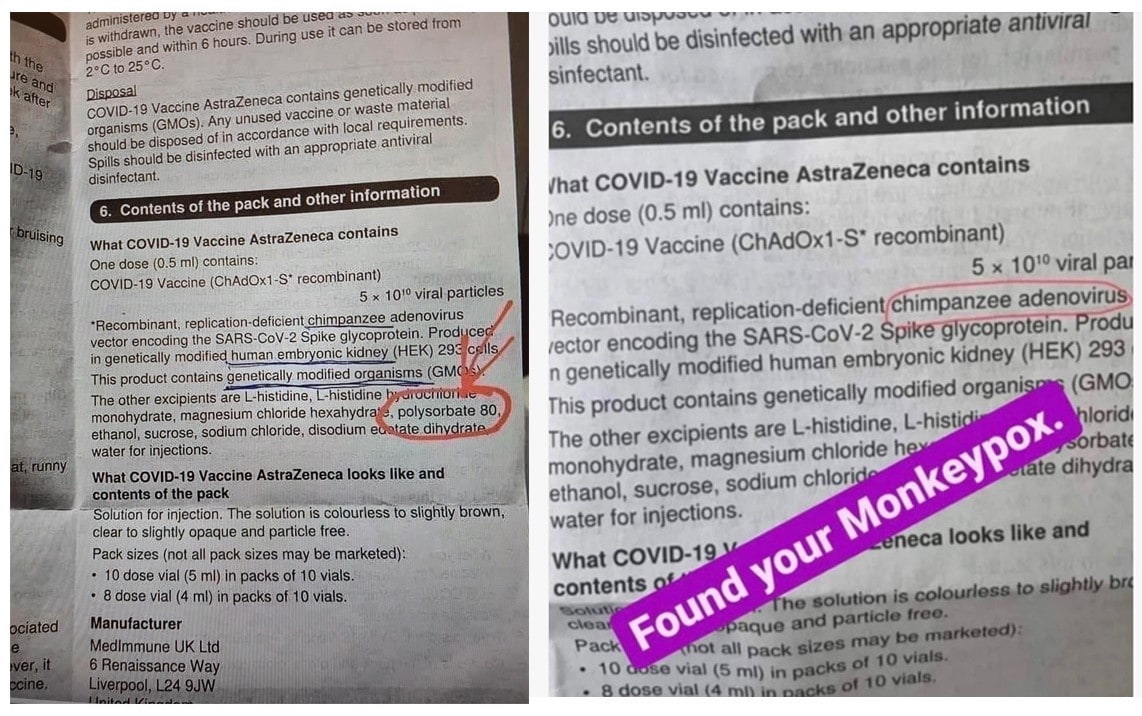
Ingredient in AstraZeneca COVID vaccine does not cause monkeypox
What was claimed |
The verdict |
The AstraZeneca COVID vaccine contains an ingredient called “chimpanzee adenovirus” that social media users are suggesting is linked to the global outbreak of monkeypox. |
False. There is no correlation whatsoever between the AstraZeneca vaccine and monkeypox. |
By Eiddwen Jeffery
Misinformation linking COVID-19 vaccines and monkeypox have taken a new turn, with social media users making baseless claims of a correlation between the AstraZeneca COVID vaccine and monkeypox because the vaccine contains an ingredient called a “chimpanzee adenovirus”.
Posts containing an image of the AstraZeneca COVID ingredients list, with annotations added by social media users highlighting the “chimpanzee adenovirus”, have been circulating on several platforms including Facebook and Twitter.
One user posted the image under the heading, “And they wonder why we are sceptical!!!”; another wrote, “found your monkeypox”; while another asked rhetorically, “what’s wrong with AstaZeneca’s (sic) vaccine?

But epidemiologists have dismissed the claims, saying there is no connection between the AstraZeneca vaccine and monkeypox.
The chimpanzee adenovirus usually causes a common cold in chimpanzees. The AstraZeneca vaccine uses a weakened version of the chimpanzee adenovirus as a vector to carry the COVID vaccine component into human cells. The adenovirus is genetically changed so that it is impossible for it to grow in humans.
Once the vaccine is delivered to the cells, it triggers an immune response to COVID.
Vaccine vectors have existed for 40 years and are used in a range of treatments. Chimpanzee adenovirus has been used and tested in treatments for malaria, Ebola virus and tuberculosis.
Dr Joshua Szanyi, public health medicine registrar at the Melbourne School of Population and Global Health, told RMIT FactLab that any claims of a connection between the chimpanzee adenovirus and monkeypox “are entirely false”.
“The chimpanzee adenovirus is used as a vector in the AstraZeneca vaccine,” Dr Szanyi said. “It is harmless to humans. This viral vector [chimpanzee adenovirus] is not related to the virus that causes monkeypox.
“There is no plausible reason why the AstraZeneca vaccine would be linked to monkeypox,” he said.
Professor Catherine Bennett, chair in epidemiology at Deakin University, echoed Dr Szanyi’s comments. She told RMIT FactLab monkeypox was not related to the adenovirus, as the virus belongs to a different family of viruses known as the variola family - the same virus that causes smallpox.
She said the chimpanzee adenovirus is genetically modified prior to being used in vaccinations to be “harmless” to humans.
Monkeys are not chimpanzees. Monkeypox was given its name after it was first identified in monkeys used in a research lab in Denmark in 1958, according to the World Health Organisation (WHO).
The first human case of monkeypox was recorded in 1970 and has since appeared in central and western African countries. The viral infection is spread through skin-to-skin contact or prolonged or intimate exposure with someone with the virus.
The recent outbreak stems from an initial cluster of cases found in the United Kingdom in May and has since spread to over 90 countries. The virus outbreak was declared a public health emergency of international concern by WHO in July.
The verdictFalse. There is no link between the use of the chimpanzee adenovirus as a vector in the AstraZeneca COVID vaccine and monkeypox. Monkeypox is caused by the monkeypox virus. Chimpanzees are not monkeys.
|


Acknowledgement of Country
RMIT University acknowledges the people of the Woi wurrung and Boon wurrung language groups of the eastern Kulin Nation on whose unceded lands we conduct the business of the University. RMIT University respectfully acknowledges their Ancestors and Elders, past and present. RMIT also acknowledges the Traditional Custodians and their Ancestors of the lands and waters across Australia where we conduct our business - Artwork 'Sentient' by Hollie Johnson, Gunaikurnai and Monero Ngarigo.
More information